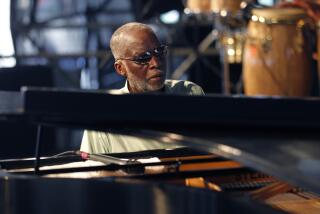AN AMERICAN IN DENMARK
- Share via
The word expatriate bothers Ed Thigpen, an American drummer who has been based in Copenhagen for the past 13 years.
“I took the trouble of looking up that word in the dictionary,” he said the other day, “and one of the definitions refers to renouncing one’s native country. That really bothers me, because it’s something I’ve never done. Of all the American musicians living in Europe, you could probably count on one hand those who have given up their passports.”
Two theories have been applied to jazz expatriation. One is that black musicians go to Europe because of racial problems in the United States. The other is that Europeans love jazz and provide greater work opportunities.
Neither situation applies to Thigpen, who was in town recently to attend the National Assn. of Jazz Educators convention in Anaheim and to play several nights at the Silver Screen Club in West Hollywood.
“I was doing very well at home and had no particular desire to live in Europe. I worked with the top people--six years with Oscar Peterson, several years off and on with Ella Fitzgerald--so I had no complaints,” he said.
“My reason for moving wasn’t political, racial or financial. I simply fell in love with a Danish girl, and when I brought her back here she couldn’t make the adjustment. Meanwhile, Ella had to lay off because of an eye operation; my wife was in Copenhagen, so I went over there and she gave birth to our daughter, Denise, who’s now 13 1/2. All of a sudden, flying back to L.A., I said to myself, ‘Why not just move over there?’ I thought maybe I’d wind up commuting, but it didn’t work out that way.
“As for the money, my income dropped by four-fifths. Between lost income, selling property, canceling insurance and other necessities, in the first 5 1/2 years it cost me over a quarter of a million dollars.”
Thigpen’s wife died very young; for the last eight years, he has been a single parent, raising their daughter and an 11-year-old son, Michel. Thigpen feels at home in Copenhagen where, he says, “I can speak enough Danish to keep the bills in order.” He speaks mostly English with his children, “but they communicate with each other in Danish. My daughter now has good command of English, Danish, German, a little Swedish and Turkish.
“The life experience I’ve had to deal with because of my move has afforded me an opportunity to grow, to develop in many ways as a human being. I won’t say it was just fate, but somehow every move in my life seems to have had the effect of a guiding force.”
Thigpen’s career has taken him through a series of geographical stages, each in its own way important to his evolution. Born in Chicago, he was raised in Los Angeles, gaining his first jazz experience in the school swing band at Thomas Jefferson High, and winning the school’s music award. He spent a year at Los Angeles City College as a sociology major, but decided on a career in music and left to live, for a year, in St. Louis with his father, Ben Thigpen (1909-1971), a celebrated drummer who in the 1930s and ‘40s played with the Andy Kirk orchestra.
“My father showed me a lot about the use of the bass drum, how to use it in tandem with the sound of the bass violin,” Thigpen said. “He showed me a lot of things about the related roles of the bass drum, the snare drum, the ride cymbal--I was able to incorporate some of the lessons I learned from him in an article I wrote for the magazine Modern Drummer.”
After working with Cootie Williams’ band at the Savoy Ballroom in New York, the younger Thigpen was able to turn his father’s counsel to good use, as a drum instructor with the 6th Army Band Training Unit at Ft. Ord. Later, he served in Korea with the 8th Army Band.
Next came four years in a series of small group jobs with Dinah Washington, Toshiko Akiyoshi and Billy Taylor, after which he joined the Oscar Peterson Trio in 1959; the third member was the bassist Ray Brown.
“The three of us were all based in Toronto for quite a while, as Oscar had started his Advanced School of Contemporary Music there. But this, too, was not a matter of expatriation, just a question of convenience,” Thigpen said.
After the years with Peterson and a tour with Fitzgerald, Thigpen settled in Los Angeles and free-lanced with Johnny Mathis, Peggy Lee and Oliver Nelson, followed by almost four more years with Fitzgerald until he made the Copenhagen decision.
“Of course, I never made and still don’t make a living in Denmark. That’s a small country. For me, it’s just a comfortable place to use as home base. To travel the equivalent of a cross-country tour of the U.S., you have to go through many countries in Europe,” he said.
Traveling has become a less necessary part of his life since he became heavily involved with jazz education, instructing once a week at the Conservatory and taking private students. “I’ve worked hard at developing two good programs, one for drummers and the other for general music education.”
Thigpen has published four books: “Ed Thigpen Talking Drums”; “Be Our Guest,” with Ray Brown; “Rhythm Brought to Life” and, most recently, “The Sound of Brushes.”
Max Roach, Jack de Johnette, Billy Cobham, Tony Williams and Butch Miles have endorsed the “Brushes” book. Thigpen explains the need for such a work: “Since the emergence of rock, which for the most part has always required heavy drumming, the brushes were set aside, or, for most of the young players who began during this period, have never been used at all. My father and many others--Jo Jones, Art Blakey, Buddy Rich, Max (Roach), Shelly Manne, Elvin Jones--all had a great influence on my use of the brushes, which I still believe must remain an important part of any drummer’s performance.”
The “Brushes” book is accompanied by a 90-minute audiocassette. In addition, Thigpen also has a one-hour video of a drum clinic he gave, in which he demonstrates solos using first his hands, then brushes, later sticks and finally mallets.
His books, cassettes and video are gradually making their way into the American classroom. “That’s one reason I came over here--to make more of the jazz educators aware of what I’ve been doing. I’m hopeful that my books and cassettes will be accepted as texts for widespread use.”
Despite his intense involvement with education, Thigpen still spends part of each year playing--in Europe with the pianist Kenny Drew and the formidable Danish bassist Niels-Henning Orsted Pedersen; in the States occasionally with pianist Monty Alexander, vibraphonist Milt Jackson and bassist John Clayton.
Given the renaissance of his name through his educational works, would he consider moving back to America?
Thigpen paused a moment, smiled, and said: “I wouldn’t want to uproot my children. However, one never says never.”
More to Read
The biggest entertainment stories
Get our big stories about Hollywood, film, television, music, arts, culture and more right in your inbox as soon as they publish.
You may occasionally receive promotional content from the Los Angeles Times.










